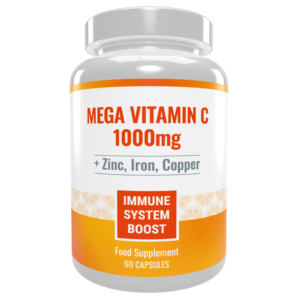On Keto and Wondering About Vitamin C?
Do you worry about getting enough vitamin C on your Keto diet? Fruit is out because it’s too high in carbs. Should we be worried? Not really.
Despite its glorious reputation, fruit is not that good for you on balance.
Most fruit is very high in sugar
Keto dieters call fruit “nature’s candy” for a reason. All those vitamins come at a price – a hit of fructose invading your bloodstream and pushing you out of ketosis.
Juices and smoothies are even worse because all the fibre is removed. For example, Tropicana orange juice has the same sugar content as Coca-Cola!
Vegetables are rich in vitamin C
Many vegetables actually have a much higher vitamin content than fruit. So you don’t have to compromise.
The best natural source of vitamin C is not oranges or lemons. It’s humble yellow bell peppers. They have over three times (yes, 3 times!) more vitamin C than oranges.
So if you are on Keto and looking for natural sources of vitamin C – here’s our list of top low-carb foods that are rich in vitamin C.
Keto Foods High in Vitamin C
Yellow Bell Pepper
| Per 100g (3.5oz) | Vitamin C | 305% DV | Net carbs | 5g |
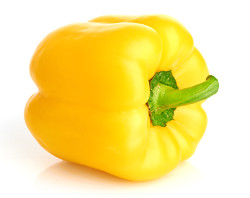
On top of our list is yellow bell pepper, providing a whopping 305% of your daily vitamin C requirement in 100g (that’s about a half of a large pepper). The same amount of oranges would only give you 88% of your daily value of vitamin C, but with double the carbs.
The best way to eat peppers is fresh – just cut it in strips and enjoy with a dip, or add peppers to salads and vegetable smoothies. Roasted peppers are also lovely.
Red bell pepper
| Per 100g (3.5oz) | Vitamin C | 212% DV | Net carbs | 4g |
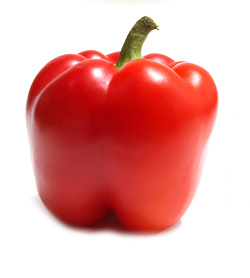
Red bell pepper gets its own entry, as it has a slightly different nutritional profile.
It is not as high in Vitamin C as its yellow cousin, but it still beats oranges hands down.
So if you can’t find any yellow peppers, red bell peppers are next on the list.
Kale
| Per 100g (3.5oz) | Vitamin C | 200% DV | Net carbs | 5g |
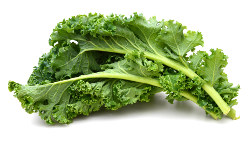
Kale might look like glorified grass but is ridiculously nutritious. A small 100g portion has 200% of your daily vitamin C requirement.
It is also very high in Vitamin A, iron, magnesium and fibre.
Make salads and smoothies with kale, fry or steam for a side dish, or add it to soups and stews.
Broccoli
| Per 100g (3.5oz) | Vitamin C | 148% DV | Net carbs | 4.5g |

Broccoli is a very versatile vegetable. It can be a simple side dish on its own. It can also play a central role in soups, frittatas and gratins.
Strong-tasting cheese (like cheddar, stilton or parmesan) is a good companion for broccoli.
Brussels sprouts
| Per 100g (3.5oz) | Vitamin C | 141% DV | Net carbs | 5g |
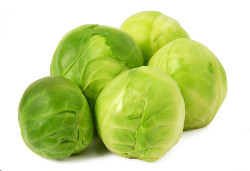
These tiny cabbages are nutritional gems. Their reputation of blandness is mostly due to boring cooking methods like boiling. They are great if you fry or roast them instead, with plenty of fat.
Bacon works well to jazz up Brussels sprouts. It helps to bring out their more adventurous side – so try frying them together.
Strawberries
| Per 100g (3.5oz) | Vitamin C | 97% DV | Net carbs | 6g |

Berries are great as a low-carb treat. Most of them are quite high in vitamins. Strawberries are the best choice for vitamin C.
Fresh strawberries are fantastic, especially when in season. Frozen strawberries work well in smoothies and dessert recipes.
Cauliflower
| Per 100g (3.5oz) | Vitamin C | 80% DV | Net carbs | 3g |
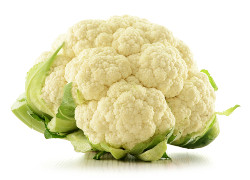
And last but not least, we have the queen of low-carb vegetables – cauliflower. Cauliflower is a great low-carb substitute for potatoes and rice, so it is already hugely popular.
If you needed another reason to eat cauliflower, think of its high vitamin C content – almost as high as oranges.
Still worried about vitamin C?
If you are still worried about getting enough vitamin C, consider taking a supplement.
It’s a simple insurance policy against nutritional deficiencies.
Mega Vitamin C with Zinc, Iron and Copper
- Mega-strong Vitamin C – 1000mg: over 10x more
than in standard supplements - Enhanced with Zinc, Copper and Iron
- 100% Sugar-Free and Zero-Carb


